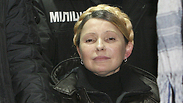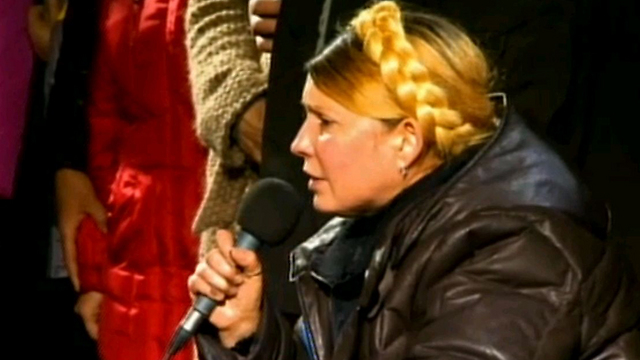
The whereabouts of Ukrainian President Viktor Yanukovych were unclear on Sunday, a day after he left the capital and his arch foe Yulia Tymoshenko was freed from prison and returned to Kiev to address a massive, adoring crowd.
A plane with Yanukovych onboard was denied permission to take off Saturday evening from Donetsk, a city in eastern Ukraine that is the president's base of support, en route to Russia, the State Border Guard Service said. The president's spokesman said Sunday morning that even he does not know where Yanukovych is.
An order has been given to arrest Ukraine's former incomes minister Oleksander Klimenko and former prosecutor-general Viktor Pshonka, parliament was told on Sunday.
Related stories:
- Jewish agency to extend emergency aid to Ukraine's Jewish community
- Ukraine's freed Tymoshenko: 'A dictatorship has ended'
- Ukraine: Ex-leader freed after parliament votes to dismiss president
Oleh Makhnytsky, acting prosecutor general, said: "An investigation has been opened and an investigating-operational group is working for the detention of these people to bring them to trial."
Ukraine's new acting interior minister, Arsen Avakov, also told parliament that police were working with state security and the prosecutor's office to investigate "grave crimes against the Ukrainian people, including those by former state leaders."
The Kiev protest camp at the center of the anti-Yanukovych movement was calm but still full of dedicated demonstrators Sunday morning, after a day that saw a stunning reversal of fortune in a political standoff that has worried the United States, Europe and Russia.
Ukraine is deeply divided between eastern regions that are largely pro-Russian and western areas that widely detest Yanukovych and long for closer ties with the European Union. Yanukovych's shelving of an agreement with the EU in November set off the wave of protests, but they quickly expanded their grievances to corruption, human rights abuses and calls for Yanukovych's resignation.
The political crisis in the nation of 46 million has changed with blinding speed repeatedly in the past week. First there were signs that tensions were easing, followed by horrifying violence and then a deal signed under Western pressure that aimed to resolve the conflict but left the unity of the country in question.
Protester self-defense units who have taken control of the capital peacefully changed shifts Sunday. Helmeted and wearing makeshift shields, they have replaced police guarding the president's administration and parliament, and have sought to stop radical forces from inflicting damage or unleashing violence.
Thousands of curious and contemptuous Ukrainians roamed the suddenly open grounds of the lavish compound outside Kiev where Yanukovych was believed to live.
Parliament, which he controlled the previous day but is now emboldened against him, voted to remove him and set elections for May 25. But Yanukovych said in a televised address that he now regards the parliament as illegitimate and he won't respect its decisions.
Tymoshenko, whose diadem of blond peasant braids and stirring rhetoric attracted world attention in the 2004 Orange Revolution, was both sad and excited as she spoke to a crowd of about 50,000 on Kiev's Independence Square, where a sprawling protest tent camp was set up in December. Sitting in a wheelchair because of a back problem aggravated during imprisonment, her voice cracked and her face was careworn.
But her words were vivid, praising the protesters who were killed this week in clashes with police that included sniper fire and entreating the living to keep the camp going.
"You are heroes, you are the best thing in Ukraine!" she said of the victims. The Health Ministry said the death toll in clashes between protesters and police that included sniper attacks had reached 82 over the last week. The protesters put that figure at over 100.
And she urged the demonstrators not to yield their encampment in the square, known in Ukrainian as the Maidan.
"In no case do you have the right to leave the Maidan until you have concluded everything that you planned to do," she said.
The crowd was thrilled.
"We missed Yulia and her fire so much," said demonstrator Yuliya Sulchanik. Minutes after her release, Tymoshenko said she plans to run for president, and Sulchanik said "Yulia will be the next president -- she deserves it."
Yanukovych's authority in Kiev appeared to be eroding by the hour and suspicions mounted that he was trying to get out o of the country. His support base crumbled further as a leading governor and a mayor from the eastern city of Kharkiv fled to Russia.
A plane carrying Yanukovych tried to take off Saturday evening from the eastern city of Donetsk but didn't have the proper documentation so was turned away, Oleh Slobodyan of the State Border Guard service said Sunday. The president was driven off in a car from the airport, he said. Slobodyan said there has been no record of Yanukovych leaving Ukraine by land, and it was not clear where the plane was headed.
Yanukovych, who spoke on television Saturday in Kharkiv, accused his opponents of trying to overthrow the government.
"Everything that is happening today is, to a greater degree, vandalism and banditry and a coup d'etat," he said. "I will do everything to protect my country from breakup, to stop bloodshed."
The conviction of Tymoshenko was one of the underlying issues driving the protests.
After the 2004 Orange Revolution helped bring Viktor Yushchenko to the presidency, Tymoshenko became prime minister. But when Yanukovych won the 2010 election, Tymoshenko was arrested and put on trial for abuse of office, an action widely seen as political revenge.
EU foreign affairs chief Catherine Ashton welcomed the release of Tymoshenko as "an important step forward in view of addressing concerns regarding selective justice in the country."
Russia came out Saturday firmly against the peace deal, saying the opposition isn't holding up its end of the agreement, which calls for protesters to surrender arms and abandon their tent camps. Tymoshenko's entreaty is likely to make the latter condition slow to be fulfilled.
European officials urged calm. Ukraine's defense and military officials also called for Ukrainians to stay peaceful but did not clearly come on the side of the president or opposition.
The past week has seen the worst violence in Ukraine since the breakup of the Soviet Union a quarter-century ago. At Independence Square Saturday, protesters heaped flowers on the coffins of the dead.
"These are heroes of Ukraine who gave their lives so that we could live in a different country without Yanukovych," said protester Viktor Fedoruk, 32. "Their names will be written in golden letters in the history of Ukraine."
Gorbachev: Ukraine failed to act democratically
Former Soviet leader Mikhail Gorbachev said Sunday that the crisis in Ukraine stems from the government's failure to act democratically.
He spoke a day after demonstrators took over the capital of Kiev and seized the president's office as parliament voted to remove him and hold new elections.
"Ultimately this is the result of the failure of the government to act democratically" and to engage in dialogue and fight corruption, Gorbachev said during an address to a forum on government communications in the city of Sharjah in the United Arab Emirates.
He added that the root cause of the unrest in Ukraine was an "interruption of perestroika," referring to his reform policies, and of the democratic process there.
The 82-year-old Gorbachev was the last leader of the Soviet Union, and the reforms he put in place helped lead to the fall of Communism.
After becoming the Soviet leader in March 1985, he pursued the policies of using "glasnost" or openness, and "perestroika" or restructuring. While his intent had been only reform, the policies brought about democratic changes that eventually led to the collapse of the Soviet Union in 1991.
















